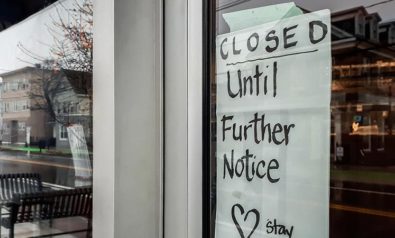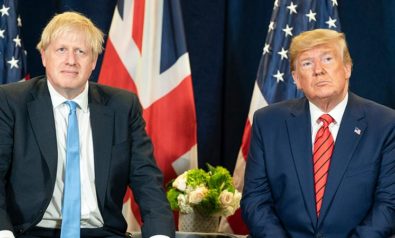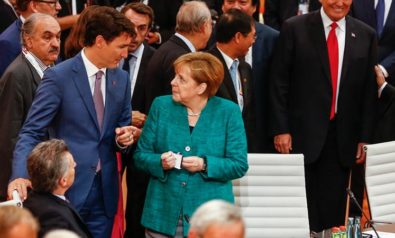As COVID-19 continues to impact markets and national and global economies, it is worthwhile noting that Gulf economies were already slowing before the virus hit the region. A comprehensive assessment by London-based Capital Economics, released on February 25 but based on statistics up to the end of December 2019, illustrates that point. (China alerted the World Health Organization on December 31 to “several cases of unusual pneumonia in Wuhan.”)
The leading economies of Saudi Arabia and the United Arab Emirates both showed weaknesses. In the case of the UAE, the Purchasing Managers Index (PMI), a measure of the prevailing direction of economic trends in the manufacturing and service sectors, fell below the 50 mark for the first time, an indication of contraction in those sectors. That, combined with a 6% year-on-year drop in real estate prices led by a weak Dubai real estate sector and private sector credit growth that slowed to its lowest point in three years, is a marker of concern.
Of growing concern, too, for the Emiratis is Expo 2020. The exhibition is slated to launch in October of this year and run through to April 2021. Cancellation of the event, which is now a distinct possibility, would have a big negative impact on Dubai, where it was hoped it would help float an already troubled economy.
In the Doldrums
Regarding the Saudi economy, Capital Economics’ Jason Tuvey notes that “the downturn deepened in Q4 of last year and, while the worst has probably now passed, the downside risks to the outlook are mounting.” He acknowledged that though the worst was probably now over, growth in 2020 will be subdued, saying that “we have pencilled in GDP growth of 1.3% this year. Our forecast is well below the consensus and the risks are increasingly skewed to the downside.” Chief among those is the price of oil which, as a result of the failure last week from OPEC+ to secure a production limit and the Saudi decision to launch a price war with Russia, has now fallen to below $40.
The religious tourist market in Saudi Arabia has been undercut, with the annual Umrah pilgrimage temporarily halted — a blow for the time being to the country’s audacious plans to hike dramatically all types of tourism as part of its Vision 2030 project. Included in the plan is the goal of turning the kingdom into one of the top five tourist destinations in the world, creating 1 million new jobs in the process. Along the way, tourism is supposed to generate 10% of the Saudi GDP. Those were always lofty aims, unlikely to be fully realized. COVID-19, though its effects may not be long-lasting, has put a dent into those plans just as the Saudis were poised for take-off.
Qatar, which had previously ridden out the economic impact of the feud with its Gulf neighbors, the UAE, Saudi Arabia and Bahrain, is now “in the doldrums.” As Capital Economics puts it, “activity in the non-hydrocarbon sector remains weak. The recent credit boom has passed its peak. Activity in the real estate sector is sluggish. The number of properties sold in December fell by 17% y/y and real estate prices declined by more than 8% y/y — prices are over 25% below their 2015 peak. And the Markit PMI fell back from 49.4 in December to 48.7 last month. On a positive note, tourist arrivals jumped in December close to levels last seen before the blockade was imposed in mid-2017.” But, as elsewhere in the Gulf, tourist numbers will decline as the epidemic continues to spread. And should the coronavirus linger, even the 2022 FIFA World Cup could be in jeopardy.
Terrific Pummeling
Both Oman and Bahrain, the weakest of the Gulf Cooperation Council economies, continue to feel the hurt from low oil prices. Bahrain’s ongoing political impasse and the drain on the economy of a heavy security commitment aimed at keeping its majority Shia Muslim population cowed has not helped. Even Kuwait, which ended a long-running dispute with Saudi Arabia over a shared oil field, has suffered from weak investment in the private sector.
In the short term, Middle East equity markets have taken a terrific pummeling from the global impact of COVID-19. According to Bloomberg, the markets took a combined $77-billion hit in the week beginning February 24 as oil prices slumped to their worst performance since 2008. The Saudis were the biggest losers, dropping $41.7 billion, while shares of Saudi Aramco dropped to their lowest level since the initial public offering in December last year.
But will the additional burden of the coronavirus have a long-lasting impact on the already ailing Gulf economies? That’s the $64-billion question. Pessimists suggest that as the virus wends its way through the world, the Gulf states will be hit hard, particularly as several of them, the most powerful, are built on hydrocarbons. There are others, however, who argue that the voice of pessimism is too strong. They point to the fact that China now appears to have contained COVID-19 and that the number of new cases is rapidly falling.
One such optimist is Oilprice.com’s Josh Owens. He notes that China, having successfully contained the epidemic, has already started to reboot its economy. Owens writes: “China is getting back to work. And you can be sure that the Chinese government will be doing everything in its power to stimulate growth.” If that is the case, it should be good news for the Gulf’s hydrocarbon producers and their stalling economies. The problem is that no one either in the Gulf or anywhere else knows where the coronavirus is headed nor how big the impact will be. But with reports of cases growing across the region, the economic prognosis, in the short to medium term, is not looking particularly healthy.
*[This article was originally published by Gulf House.]
The views expressed in this article are the author’s own and do not necessarily reflect Fair Observer’s editorial policy.
Support Fair Observer
We rely on your support for our independence, diversity and quality.
For more than 10 years, Fair Observer has been free, fair and independent. No billionaire owns us, no advertisers control us. We are a reader-supported nonprofit. Unlike many other publications, we keep our content free for readers regardless of where they live or whether they can afford to pay. We have no paywalls and no ads.
In the post-truth era of fake news, echo chambers and filter bubbles, we publish a plurality of perspectives from around the world. Anyone can publish with us, but everyone goes through a rigorous editorial process. So, you get fact-checked, well-reasoned content instead of noise.
We publish 2,500+ voices from 90+ countries. We also conduct education and training programs
on subjects ranging from digital media and journalism to writing and critical thinking. This
doesn’t come cheap. Servers, editors, trainers and web developers cost
money.
Please consider supporting us on a regular basis as a recurring donor or a
sustaining member.
Will you support FO’s journalism?
We rely on your support for our independence, diversity and quality.
































